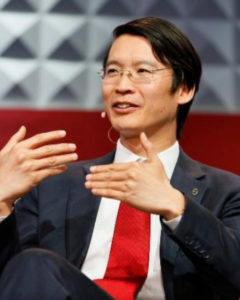
Winston Wenyan Ma
CFA & Esq., NYU School of Law Adjunct Professor; former Managing Director of CIC
Q&A with Winston Ma
The COVID-19 global pandemic has sent the global economy into a deep recession. Meanwhile, China and the U.S., the two powerhouses of digital economy, is accelerating the tech decoupling. Winston Wenyan Ma, author of The Hunt of Unicorns and former Managing Director, China Investment Corporation, answers questions on the role of asset owners in economic recovery to implications of China-U.S. decoupling.
Q: The COVID-19 pandemic has brought the global economy into a recession. One of the ways that economy can get back to sustainable growth is through investments from asset owners. How do you think these funds can play a role for economy to grow?
A: Asset owners have become a stabilizing force in the global capital markets for stocks and bonds because of their long investment time horizons and acceptance of long-term risk. Also, the asset owners are supporting their domestic economies directly. In North America, one sovereign fund with the management of pensions assets among its assigned tasks has taken on its superhero rescue mission. Dealing with the impact of the pandemic on the local economy, Caisse de Dépôt et Placement du Québec (CDPQ) in Québec, Canada has in early 2020 created a C$4 billion fund to support Quebec companies adversely affected by the coronavirus, whether or not they are in its portfolio. This program was quickly introduced to enable the recipient companies to survive the pandemic and underpin the recovery of the local economy.
Q: Previously you were the Managing Director and Head of the North America Office for the China Investment Corporation (CIC), China’s sovereign wealth fund, for 10 years. How have you seen the role of asset owners changed in the last decade?
A: The asset owners are the new, powerful venture capitalists. Their ample resources, long time horizon, as well as their need to diversify globally and by sector have helped to transform the investment world and, in particular, private VC markets for digital companies. Because of the large size of their investments, they are the “unicorn makers”. They have shaken off their traditional, passive investor roles and stepped into the vanguard of the digital transformation we are all living through. They have fostered the rise of the likes of Uber, Alibaba, Spotify and other transformative players in the digital economy, while providing their founders and business models the benefit of long-term capital.
Q: How has the global digital sharing economy evolved as a result of the pandemic?
A: The pandemic has provided a new catalyst for the global digital sharing economy. If we look at China for an example, the behaviour changes from the pandemic have led to sharing economy developments. Three years ago, China’s bike-sharing sector was booming, and start-ups crammed city streets with colourful two wheelers. The bubble burst in 2019, resulting in a wave of bankruptcies and huge bike graveyards. Now the COVID-19 pandemic is sparking a new enthusiasm for cycling in China, as people avoid buses and subways for fear of infection.
Q: With China and the US being two powerhouses in the digital economy, what are the risks and implications of them going head to head?
A: True, a US-China tech decoupling is real and accelerating. Hence the digital economy is in a vital conflict and crisis: the global tech world, and together with at least part of the world economy, is now fractured into two – and potentially more. Thus, the fundamental risk is a potentially “fragmented” cyberspace. The biggest loser is the next billion users from emerging markets, as the global tech tensions will slow down internet connectivity to close off half of the world population who are not even linked to the internet yet. And by the time they are online, the internet is no longer the same anymore. The cyberspace could become more of a patchwork of fiefs as varied as the visa policies that fragment world travel.
Winston Ma specialises in the global digital economy, cross-border investments, and multinational law and policy with a specific interest in the US-China relations. Ma spent 10 years as the Managing Director and Head of the North America Office for the China Investment Corporation (CIC), China’s sovereign wealth fund, where he made cross-border digital economy investments and sought out synergies between China and world markets. His latest book, The Hunt for Unicorns: How Sovereign Funds Are Reshaping Investment in the Digital Economy, will be released in mid-October 2020.
Winston spoke at Institutional Connect Virtual Forum in October 2020.
